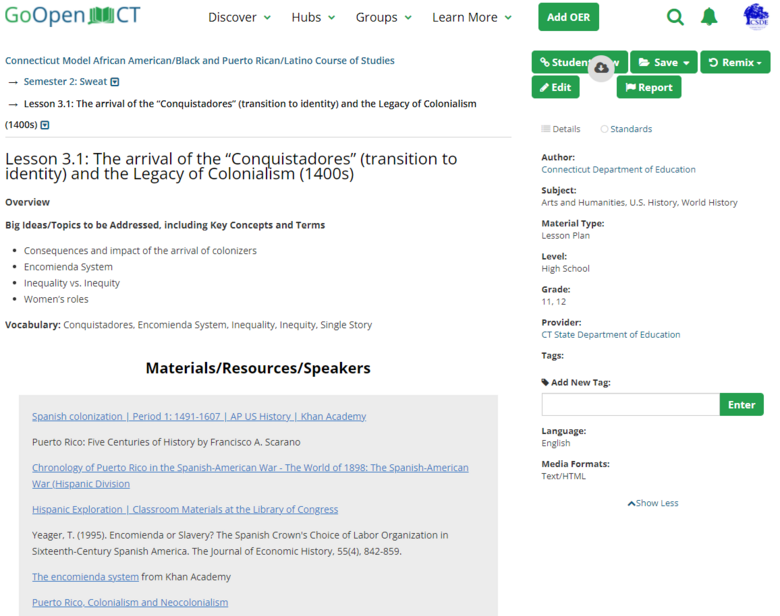Lesson 3.1-1: The arrival of the “Conquistadores” (transition to identity) and the Legacy of Colonialism (1400s)

Overview
Big Ideas/Topics to be Addressed, including Key Concepts and Terms
Consequences and impact of the arrival of colonizers
Encomienda System
Inequality vs. Inequity
Women’s roles
Vocabulary: Conquistadores, Encomienda System, Inequality, Inequity, Single Story
Materials/Resources/Speakers
Spanish colonization | Period 1: 1491-1607 | AP US History | Khan Academy
Puerto Rico: Five Centuries of History by Francisco A. Scarano
Hispanic Exploration | Classroom Materials at the Library of Congress
Yeager, T. (1995). Encomienda or Slavery? The Spanish Crown's Choice of Labor Organization in Sixteenth-Century Spanish America. The Journal of Economic History, 55(4), 842-859.
The encomienda system from Khan Academy
Puerto Rico, Colonialism and Neocolonialism
On Indigenous Peoples' Day, meet the survivors of a 'paper genocide'
The Individualist Legacy in Latin America.
Gender and Race in Colonial Latin America. Women in World History: Case Studies
Hanger, Kimberly S. “‘The Most Vile Atrocities’: Accusations of Slander Against María Cofignie, Parda Libre (Louisiana, 1795),” in Richard Boyer and Geoffrey Spurling, eds., Colonial Lives: Documents in Latin American History, 1550-1850, (Oxford University Press, 2000), 269-278.
Historia de Puerto Rico: Trayectoria de un pueblo. Author: Blanca Silvestrini
History of Puerto Rico. Author: Fernando Pico
Recommended Learning Activities, including UDL Principles/Scaffolded Supports and Asynchronous and Synchronous Learning Opportunities
Day 1
Initiation: Teacher introduces the purpose and the objectives of the unit with a pre-assessment. Students list all of the countries and the capitals that they know of Latin America and then write a sentence or bullets about what they know of each of the countries.
Teacher writes the word “Colonization” on the board and have students brainstorm ideas about what they know about colonization. Teacher conducts mini-lesson about the arrival of the colonizers.
Introduce the concept of multiple perspectives as it relates to the unit (e.g., how hard people of Latin America countries worked while continuing to be taken advantage of and oppressed. Stories of individual and collective perseverance eventually led to a new evolution of identity and resiliency.) Remind students that the history that they are going to learn about is not about one perspective, rather from multiple ways of knowing and sharing history.
Activity: Teacher provides context of how Spaniard arrival changed the labor system (e.g., The Birth of Spanish America). Then, students choose one of the four women from the reading to research answering the following:
The most surprising part of this introductory reading. Explain.
Name of person chosen
Source
5 NEW facts
Day 2
Activity: Teacher starts by providing a mini-lecture ”on the organization of labor for the purpose of God, Gold, and Glory” and introduces the first form of economic system called the Encomienda System. Students read, annotate, and discuss questions in pairs or as a class The Encomienda ACTIVITY The Encomienda ANSWER SHEET.
Day 3
Initiation: Watch and discuss Chimamanda Ngozi Adichie: The danger of a single story.
Activity: In small groups, students research the varying viewpoints and perspectives on the Encomienda System of the enslaved Africans, enslaved Indigenous, and Spaniards/Colonizers. Students then prepare for debate from the perspectives that they researched answering the following questions:
How was the Encomienda System similar to or different from slavery?
How did/didn’t the Encomienda System create/contribute to racial hierarchies?
How do/don’t we think about “the other”? Who gets to tell the history of Puerto Ricans and Latinos?
Closing: Students discuss understanding of how issues of inequality and desire for freedom influence culture and/or new cultural patterns in different countries of Puerto Rico and Latin America.
Home Links/Reflections to Affirm Identity
Students watch a video with their families and discuss things that they did not know about Indigenous populations in Puerto Rico.
New research links ancient indigenous DNA to living Puerto Ricans
Compose a song with their families using African roots and/or Indigenous roots.
Options for Content Continuity Across History Courses and Interdisciplinary Integration
Economics
English (Please see resources for titles)
Music
Extensions/Experiential Opportunities
Before and After the Conquest:
Indigenous Music
“Mestizo” Music
African-derived Music